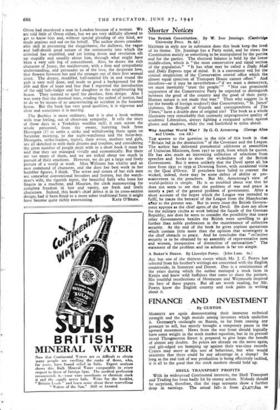THE answer to the question in the title of this
book is that " Britain led in the destruction " of the Covenant and the League. The author has delivered presidential addresses at assemblies of Unitarian Ministers, from 1917 to 1938, from which he quotes. He has also made an interesting collection of selections from speeches and books to show the wickedness of the British Government. But it seems unlikely that the Devil spent all his time from 1931 to 1939 at Downing Street, with occasional visits to the Quai d'Orsay. If preachers have failed to convert the wicked, indeed, there may be some defect of ability or per- suasiveness in the preachers. But Mr. Armstrong's view of world-politics is simple. He is so troubled about war that he does not seem to see that the problem of war and peace is merely a part of the general problem of government. After a short account of the hopes which the League was intended to fulfil, he traces the betrayal of the League from the Manchurian affair to the present war. But in every issue the British Govern- ment appears as the chief agent.of the Devil. He does not allow for the military circles at work behind the facade of the German Republic; nor does he seem to consider the possibility that many other Governments besides the British were unwilling to go further than noble professions in the maintenance of collective security. At the end of the book he gives copious quotations which contain little more than the opinion that sovereignty is the chief obstacle to peace. And he concludes that " collective security is to be obtained by an assembly of representative men and women, irrespective of distinction of nationalities." The statement of the problem and its solution is far too simple.






















 Previous page
Previous page